|

|



|
It’s a cliché
to say that something needs no introduction (and then, of course, to go
ahead and give one anyway), but it seems more applicable than usual to
Chateau
Montelena. Without question the estate is one of the
“crown jewels” in the Napa Valley, and has been so since its
resurrection in the 1970’s. The estate itself dates to 1882, when
Alfred L. Tubbs established a vineyard on 254 acres of rugged land
just two miles north of Calistoga at the base of Mount Saint Helena. The
first harvest came in 1886, and three years later the wine was already
being shown at the Paris World’s Fair. As with most California fine wine
estates, Prohibition ended wine production at Chateau Montelena, and the
estate essentially disappeared from the wine scene until 1972, when
James Barrett (below with Bo Barrett)
purchased the property, replanted the vineyards, and quickly
reestablished Chateau Montelena’s century-old reputation for producing
world-class wines.
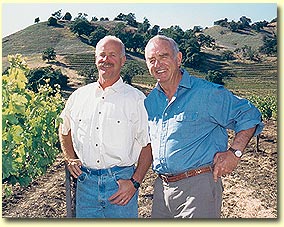 I
remember well the early days of Chateau Montelena in the Barrett era.
With wines initially made by Mike Grgich, and later by Jim
Barrett’s son, Bo Barrett, Chateau Montelena quickly established
a reputation for quality and consistency that is virtually unmatched.
One of the first Cabernets I ever bought was a 1975 vintage wine made
from a combination of Napa and Sonoma fruit (the first “estate” Cabernet
wouldn’t come until the 1978 vintage). It had a depth of fruit and
perfect balance that made it one of the super-stars of its day. And the
Chardonnay was I
remember well the early days of Chateau Montelena in the Barrett era.
With wines initially made by Mike Grgich, and later by Jim
Barrett’s son, Bo Barrett, Chateau Montelena quickly established
a reputation for quality and consistency that is virtually unmatched.
One of the first Cabernets I ever bought was a 1975 vintage wine made
from a combination of Napa and Sonoma fruit (the first “estate” Cabernet
wouldn’t come until the 1978 vintage). It had a depth of fruit and
perfect balance that made it one of the super-stars of its day. And the
Chardonnay was
|
|
even better - in an era when most California
Chardonnays were going overboard on oak, Chateau Montelena’s had the balance and
elegance, as well as the depth and complexity, of a great White
Burgundy. More than one wine-critic at the time was moved to describe
Chateau Montelena’s wines as “awe-inspiring”. As the dictionary defines
awe as “a feeling of great respect and wonder,” the description seems
apt, even to this day. For Chateau Montelena’s wines don’t often get the
“buzz” that the newest and cultist Napa Cabernets seem to garner in the
wine press and the chat boards, a recent tasting demonstrated to me that
their wines in 2008 are as great, or greater, than in their “glory days”
of the 1970’s.
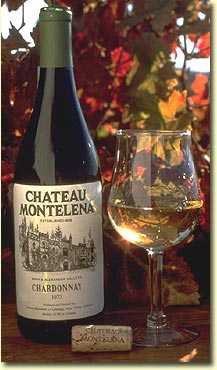 And
“shock”??? Well, sometime this year Chateau Montelena will provide the
underlying story line for
Bottle Shock, a motion picture loosely (very loosely, from early reports) based
upon Montelena’s inclusion—and victory—in the famous
Judgment of Paris And
“shock”??? Well, sometime this year Chateau Montelena will provide the
underlying story line for
Bottle Shock, a motion picture loosely (very loosely, from early reports) based
upon Montelena’s inclusion—and victory—in the famous
Judgment of Paris tasting in 1976,
conducted by the well-know British wine merchant Steven Spurrier.
This is the tasting where a panel of French judges found, to their great
shock and embarrassment, that Chateau Montelena’s 1973 Chardonnay was
superior to some of the most hallowed names in Burgundy. Names like
Beaune-Clos des Mouches, Meursault-Charmes, and Bâtard-Montrachet.
(Stag’s Leap Wine Cellars won the Cabernet half of the competition
against some of the greatest names in Bordeaux). As is often the case in
Hollywood, many of the details depicted in the movie are fictitious, but
the mere fact that Chateau Montelena’s “story” was deemed compelling
enough to form the basis for a feature-length movie is some kind of
testament to the importance and drama surrounding this great estate.
Whether “Bottle Shock” (which premiered at the Sundance Film Festival in
January, but is not yet scheduled for general release) does for Chateau
Montelena what “Sideways” did for
Pinot Noir remains to be seen, but I suspect the already high demand for
these wines will only increase once the movie is released. tasting in 1976,
conducted by the well-know British wine merchant Steven Spurrier.
This is the tasting where a panel of French judges found, to their great
shock and embarrassment, that Chateau Montelena’s 1973 Chardonnay was
superior to some of the most hallowed names in Burgundy. Names like
Beaune-Clos des Mouches, Meursault-Charmes, and Bâtard-Montrachet.
(Stag’s Leap Wine Cellars won the Cabernet half of the competition
against some of the greatest names in Bordeaux). As is often the case in
Hollywood, many of the details depicted in the movie are fictitious, but
the mere fact that Chateau Montelena’s “story” was deemed compelling
enough to form the basis for a feature-length movie is some kind of
testament to the importance and drama surrounding this great estate.
Whether “Bottle Shock” (which premiered at the Sundance Film Festival in
January, but is not yet scheduled for general release) does for Chateau
Montelena what “Sideways” did for
Pinot Noir remains to be seen, but I suspect the already high demand for
these wines will only increase once the movie is released.
So it seemed timely to take another look and see at what Chateau
Montelena is doing today. I recently had the opportunity to taste
Chateau Montelena’s new releases in anticipation of their being
distributed to the market, and had the following impressions:
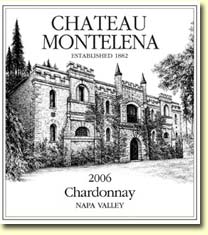 2006
Chateau Montelena Estate Chardonnay, Napa Valley, $39.99. Sadly,
production of Montelena’s great Chardonnay in 2006 is down over 60% from
2005, meaning that there will be precious little of this wine available.
It’s a real testament to the integrity of this great estate that they
did not use the reduced production as an excuse to jack up the price
significantly. The wine, as usual, is brilliant. The Montelena
Chardonnay is made today much as it was at the time of the 1976 tasting,
with only modest oak and no malolactic fermentation, preserving the
wine’s vibrancy and freshness and allowing the purity of the fruit to
shine. The 2006 is a bit richer and more open than the 2005 was upon
release, but Montelena has a remarkable record of consistency with this
wine regardless of vintage conditions. All of the Chardonnays from this
estate show vivid apple and citrus flavors enveloped in a medium-rich
body with surprising flavor intensity. Zesty yet with a honeyed texture,
the wine is long and very complex. The wine is rich, but not as unctuous
or oaky as some, offering instead a nervosity and precision that is
classic in style. Unlike most California Chardonnays, Montelena’s will
actually improve with a year or two in the cellar. Although not in the
style currently favored by many of the high-scoring Chardonnays that the
critics love, this wine is every bit as good as it was 30 years ago, a
track record that is hard to match in California wines. Find this wine 2006
Chateau Montelena Estate Chardonnay, Napa Valley, $39.99. Sadly,
production of Montelena’s great Chardonnay in 2006 is down over 60% from
2005, meaning that there will be precious little of this wine available.
It’s a real testament to the integrity of this great estate that they
did not use the reduced production as an excuse to jack up the price
significantly. The wine, as usual, is brilliant. The Montelena
Chardonnay is made today much as it was at the time of the 1976 tasting,
with only modest oak and no malolactic fermentation, preserving the
wine’s vibrancy and freshness and allowing the purity of the fruit to
shine. The 2006 is a bit richer and more open than the 2005 was upon
release, but Montelena has a remarkable record of consistency with this
wine regardless of vintage conditions. All of the Chardonnays from this
estate show vivid apple and citrus flavors enveloped in a medium-rich
body with surprising flavor intensity. Zesty yet with a honeyed texture,
the wine is long and very complex. The wine is rich, but not as unctuous
or oaky as some, offering instead a nervosity and precision that is
classic in style. Unlike most California Chardonnays, Montelena’s will
actually improve with a year or two in the cellar. Although not in the
style currently favored by many of the high-scoring Chardonnays that the
critics love, this wine is every bit as good as it was 30 years ago, a
track record that is hard to match in California wines. Find this wine
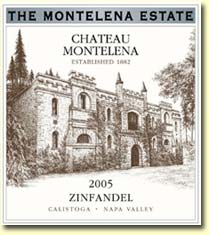 2005
Chateau Montelena Estate Zinfandel, Napa Valley, $28.99. Chateau
Montelena’s Zinfandel, like its Riesling, tends to get overlooked,
hidden in the shadows of the estates’ more famous Chardonnay and
Cabernet. That’s a shame, really, because both of these less-famous
wines are every bit the qualitative equal of the chard and cab. What
distinguishes this zin from so many others is its emphasis on balance
and complexity. It exemplifies what is sometimes called the “claret
style” of Zinfandel, one in which subtlety, complexity, and
age-worthiness is emphasized, setting it apart from the overwhelming
majority of California Zinfandels that emphasize big up-front
fruitiness. It would be interesting to compare this wine with some of
the zins from Ridge, in many ways its stylistic soul-mate. Medium bodied
and more elegant than your typical Zinfandel, the 2005 has plenty of
richness but even more complexity, with subtle hints of savory herbs and
forest underbrush. It’s a bit tight right now, so decanting would be
helpful. Unlike many, this is a Zinfandel that has the potential to
develop further with bottle age, but doesn’t require it for enjoyment
now. Find this wine 2005
Chateau Montelena Estate Zinfandel, Napa Valley, $28.99. Chateau
Montelena’s Zinfandel, like its Riesling, tends to get overlooked,
hidden in the shadows of the estates’ more famous Chardonnay and
Cabernet. That’s a shame, really, because both of these less-famous
wines are every bit the qualitative equal of the chard and cab. What
distinguishes this zin from so many others is its emphasis on balance
and complexity. It exemplifies what is sometimes called the “claret
style” of Zinfandel, one in which subtlety, complexity, and
age-worthiness is emphasized, setting it apart from the overwhelming
majority of California Zinfandels that emphasize big up-front
fruitiness. It would be interesting to compare this wine with some of
the zins from Ridge, in many ways its stylistic soul-mate. Medium bodied
and more elegant than your typical Zinfandel, the 2005 has plenty of
richness but even more complexity, with subtle hints of savory herbs and
forest underbrush. It’s a bit tight right now, so decanting would be
helpful. Unlike many, this is a Zinfandel that has the potential to
develop further with bottle age, but doesn’t require it for enjoyment
now. Find this wine
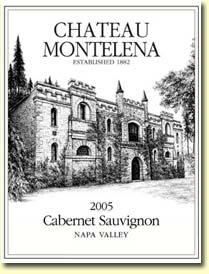 2005
Chateau Montelena Napa Cabernet Sauvignon, Napa Valley, $42.99. The
“Napa” Cabernet of Chateau Montelena (formerly known as the “Calistoga
Cuvée”) is a combination of estate and non-estate fruit, all of which
comes from the Calistoga region (like the Estate Cabernet) to maintain
the Montelena style. Blended with a bit of Merlot and Cabernet Franc,
the 2005 Napa Cabernet is one of the best in recent years, and has
received some critical raves already. This is classic Napa Cabernet,
with savory cassis and black fruits, a hint of licorice, some spiciness
and a note of mint in the finish. Packed with fruit and depth, yet with
a more classic, firmer structure than many of today’s Cabernets, and
thus not designed to score high points. As too many “pretty good”
Cabernets are now priced north of $50, this is an awfully good value in
top-quality Cabernet. I’d suggest decanting the wine for an hour or so
to allow the aromatics to fully develop. Find this wine 2005
Chateau Montelena Napa Cabernet Sauvignon, Napa Valley, $42.99. The
“Napa” Cabernet of Chateau Montelena (formerly known as the “Calistoga
Cuvée”) is a combination of estate and non-estate fruit, all of which
comes from the Calistoga region (like the Estate Cabernet) to maintain
the Montelena style. Blended with a bit of Merlot and Cabernet Franc,
the 2005 Napa Cabernet is one of the best in recent years, and has
received some critical raves already. This is classic Napa Cabernet,
with savory cassis and black fruits, a hint of licorice, some spiciness
and a note of mint in the finish. Packed with fruit and depth, yet with
a more classic, firmer structure than many of today’s Cabernets, and
thus not designed to score high points. As too many “pretty good”
Cabernets are now priced north of $50, this is an awfully good value in
top-quality Cabernet. I’d suggest decanting the wine for an hour or so
to allow the aromatics to fully develop. Find this wine
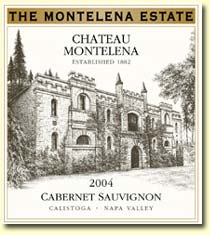 2004
Chateau Montelena Estate Cabernet Sauvignon, “The Montelena Estate”,
Napa Valley, $119.99. Made exclusively from Cabernet Sauvignon from
the original estate vineyard that was resurrected by Jim Barrett back in
the early 1970’s, Chateau Montelena’s Estate Cabernet remains one of
California’s greatest wines, a stature it has maintained for nearly
three decades. This is a larger-scaled wine than the Napa bottling, but
it retains the impeccable balance and precision for which Montelena is
famous. Featuring intense flavors of cassis, blackberry, licorice and
mint, the 2004 is a bit more forward than usual, with firm acidity and
smooth tannins completely wrapped in creamy fruit and richness. The wine
has tremendous length, suggesting the ability to age long and
advantageously in a cool cellar. It would be a shame to drink this wine
too young, as its full potential really needs a good 5 years or more to
fully develop. I wish the price were lower, but in comparison with other
top $100+ Cabernets, most of which don’t have Montelena’s track record,
I can’t say the price is unreasonable. 2004
Chateau Montelena Estate Cabernet Sauvignon, “The Montelena Estate”,
Napa Valley, $119.99. Made exclusively from Cabernet Sauvignon from
the original estate vineyard that was resurrected by Jim Barrett back in
the early 1970’s, Chateau Montelena’s Estate Cabernet remains one of
California’s greatest wines, a stature it has maintained for nearly
three decades. This is a larger-scaled wine than the Napa bottling, but
it retains the impeccable balance and precision for which Montelena is
famous. Featuring intense flavors of cassis, blackberry, licorice and
mint, the 2004 is a bit more forward than usual, with firm acidity and
smooth tannins completely wrapped in creamy fruit and richness. The wine
has tremendous length, suggesting the ability to age long and
advantageously in a cool cellar. It would be a shame to drink this wine
too young, as its full potential really needs a good 5 years or more to
fully develop. I wish the price were lower, but in comparison with other
top $100+ Cabernets, most of which don’t have Montelena’s track record,
I can’t say the price is unreasonable.
Find this wine
Photos courtesy of Chateau Montelena
Bennett Traub
Reporting From The Left Coast
Send Bennett an

|


 I
remember well the early days of Chateau Montelena in the Barrett era.
With wines initially made by Mike Grgich, and later by Jim
Barrett’s son, Bo Barrett, Chateau Montelena quickly established
a reputation for quality and consistency that is virtually unmatched.
One of the first Cabernets I ever bought was a 1975 vintage wine made
from a combination of Napa and Sonoma fruit (the first “estate” Cabernet
wouldn’t come until the 1978 vintage). It had a depth of fruit and
perfect balance that made it one of the super-stars of its day. And the
Chardonnay was
I
remember well the early days of Chateau Montelena in the Barrett era.
With wines initially made by Mike Grgich, and later by Jim
Barrett’s son, Bo Barrett, Chateau Montelena quickly established
a reputation for quality and consistency that is virtually unmatched.
One of the first Cabernets I ever bought was a 1975 vintage wine made
from a combination of Napa and Sonoma fruit (the first “estate” Cabernet
wouldn’t come until the 1978 vintage). It had a depth of fruit and
perfect balance that made it one of the super-stars of its day. And the
Chardonnay was  And
“shock”??? Well, sometime this year Chateau Montelena will provide the
underlying story line for
And
“shock”??? Well, sometime this year Chateau Montelena will provide the
underlying story line for
 2006
Chateau Montelena Estate Chardonnay, Napa Valley, $39.99. Sadly,
production of Montelena’s great Chardonnay in 2006 is down over 60% from
2005, meaning that there will be precious little of this wine available.
It’s a real testament to the integrity of this great estate that they
did not use the reduced production as an excuse to jack up the price
significantly. The wine, as usual, is brilliant. The Montelena
Chardonnay is made today much as it was at the time of the 1976 tasting,
with only modest oak and no malolactic fermentation, preserving the
wine’s vibrancy and freshness and allowing the purity of the fruit to
shine. The 2006 is a bit richer and more open than the 2005 was upon
release, but Montelena has a remarkable record of consistency with this
wine regardless of vintage conditions. All of the Chardonnays from this
estate show vivid apple and citrus flavors enveloped in a medium-rich
body with surprising flavor intensity. Zesty yet with a honeyed texture,
the wine is long and very complex. The wine is rich, but not as unctuous
or oaky as some, offering instead a nervosity and precision that is
classic in style. Unlike most California Chardonnays, Montelena’s will
actually improve with a year or two in the cellar. Although not in the
style currently favored by many of the high-scoring Chardonnays that the
critics love, this wine is every bit as good as it was 30 years ago, a
track record that is hard to match in California wines.
2006
Chateau Montelena Estate Chardonnay, Napa Valley, $39.99. Sadly,
production of Montelena’s great Chardonnay in 2006 is down over 60% from
2005, meaning that there will be precious little of this wine available.
It’s a real testament to the integrity of this great estate that they
did not use the reduced production as an excuse to jack up the price
significantly. The wine, as usual, is brilliant. The Montelena
Chardonnay is made today much as it was at the time of the 1976 tasting,
with only modest oak and no malolactic fermentation, preserving the
wine’s vibrancy and freshness and allowing the purity of the fruit to
shine. The 2006 is a bit richer and more open than the 2005 was upon
release, but Montelena has a remarkable record of consistency with this
wine regardless of vintage conditions. All of the Chardonnays from this
estate show vivid apple and citrus flavors enveloped in a medium-rich
body with surprising flavor intensity. Zesty yet with a honeyed texture,
the wine is long and very complex. The wine is rich, but not as unctuous
or oaky as some, offering instead a nervosity and precision that is
classic in style. Unlike most California Chardonnays, Montelena’s will
actually improve with a year or two in the cellar. Although not in the
style currently favored by many of the high-scoring Chardonnays that the
critics love, this wine is every bit as good as it was 30 years ago, a
track record that is hard to match in California wines.  2005
Chateau Montelena Estate Zinfandel, Napa Valley, $28.99. Chateau
Montelena’s Zinfandel, like its Riesling, tends to get overlooked,
hidden in the shadows of the estates’ more famous Chardonnay and
Cabernet. That’s a shame, really, because both of these less-famous
wines are every bit the qualitative equal of the chard and cab. What
distinguishes this zin from so many others is its emphasis on balance
and complexity. It exemplifies what is sometimes called the “claret
style” of Zinfandel, one in which subtlety, complexity, and
age-worthiness is emphasized, setting it apart from the overwhelming
majority of California Zinfandels that emphasize big up-front
fruitiness. It would be interesting to compare this wine with some of
the zins from Ridge, in many ways its stylistic soul-mate. Medium bodied
and more elegant than your typical Zinfandel, the 2005 has plenty of
richness but even more complexity, with subtle hints of savory herbs and
forest underbrush. It’s a bit tight right now, so decanting would be
helpful. Unlike many, this is a Zinfandel that has the potential to
develop further with bottle age, but doesn’t require it for enjoyment
now.
2005
Chateau Montelena Estate Zinfandel, Napa Valley, $28.99. Chateau
Montelena’s Zinfandel, like its Riesling, tends to get overlooked,
hidden in the shadows of the estates’ more famous Chardonnay and
Cabernet. That’s a shame, really, because both of these less-famous
wines are every bit the qualitative equal of the chard and cab. What
distinguishes this zin from so many others is its emphasis on balance
and complexity. It exemplifies what is sometimes called the “claret
style” of Zinfandel, one in which subtlety, complexity, and
age-worthiness is emphasized, setting it apart from the overwhelming
majority of California Zinfandels that emphasize big up-front
fruitiness. It would be interesting to compare this wine with some of
the zins from Ridge, in many ways its stylistic soul-mate. Medium bodied
and more elegant than your typical Zinfandel, the 2005 has plenty of
richness but even more complexity, with subtle hints of savory herbs and
forest underbrush. It’s a bit tight right now, so decanting would be
helpful. Unlike many, this is a Zinfandel that has the potential to
develop further with bottle age, but doesn’t require it for enjoyment
now.  2005
Chateau Montelena Napa Cabernet Sauvignon, Napa Valley, $42.99. The
“Napa” Cabernet of Chateau Montelena (formerly known as the “Calistoga
Cuvée”) is a combination of estate and non-estate fruit, all of which
comes from the Calistoga region (like the Estate Cabernet) to maintain
the Montelena style. Blended with a bit of Merlot and Cabernet Franc,
the 2005 Napa Cabernet is one of the best in recent years, and has
received some critical raves already. This is classic Napa Cabernet,
with savory cassis and black fruits, a hint of licorice, some spiciness
and a note of mint in the finish. Packed with fruit and depth, yet with
a more classic, firmer structure than many of today’s Cabernets, and
thus not designed to score high points. As too many “pretty good”
Cabernets are now priced north of $50, this is an awfully good value in
top-quality Cabernet. I’d suggest decanting the wine for an hour or so
to allow the aromatics to fully develop.
2005
Chateau Montelena Napa Cabernet Sauvignon, Napa Valley, $42.99. The
“Napa” Cabernet of Chateau Montelena (formerly known as the “Calistoga
Cuvée”) is a combination of estate and non-estate fruit, all of which
comes from the Calistoga region (like the Estate Cabernet) to maintain
the Montelena style. Blended with a bit of Merlot and Cabernet Franc,
the 2005 Napa Cabernet is one of the best in recent years, and has
received some critical raves already. This is classic Napa Cabernet,
with savory cassis and black fruits, a hint of licorice, some spiciness
and a note of mint in the finish. Packed with fruit and depth, yet with
a more classic, firmer structure than many of today’s Cabernets, and
thus not designed to score high points. As too many “pretty good”
Cabernets are now priced north of $50, this is an awfully good value in
top-quality Cabernet. I’d suggest decanting the wine for an hour or so
to allow the aromatics to fully develop.  2004
Chateau Montelena Estate Cabernet Sauvignon, “The Montelena Estate”,
Napa Valley, $119.99. Made exclusively from Cabernet Sauvignon from
the original estate vineyard that was resurrected by Jim Barrett back in
the early 1970’s, Chateau Montelena’s Estate Cabernet remains one of
California’s greatest wines, a stature it has maintained for nearly
three decades. This is a larger-scaled wine than the Napa bottling, but
it retains the impeccable balance and precision for which Montelena is
famous. Featuring intense flavors of cassis, blackberry, licorice and
mint, the 2004 is a bit more forward than usual, with firm acidity and
smooth tannins completely wrapped in creamy fruit and richness. The wine
has tremendous length, suggesting the ability to age long and
advantageously in a cool cellar. It would be a shame to drink this wine
too young, as its full potential really needs a good 5 years or more to
fully develop. I wish the price were lower, but in comparison with other
top $100+ Cabernets, most of which don’t have Montelena’s track record,
I can’t say the price is unreasonable.
2004
Chateau Montelena Estate Cabernet Sauvignon, “The Montelena Estate”,
Napa Valley, $119.99. Made exclusively from Cabernet Sauvignon from
the original estate vineyard that was resurrected by Jim Barrett back in
the early 1970’s, Chateau Montelena’s Estate Cabernet remains one of
California’s greatest wines, a stature it has maintained for nearly
three decades. This is a larger-scaled wine than the Napa bottling, but
it retains the impeccable balance and precision for which Montelena is
famous. Featuring intense flavors of cassis, blackberry, licorice and
mint, the 2004 is a bit more forward than usual, with firm acidity and
smooth tannins completely wrapped in creamy fruit and richness. The wine
has tremendous length, suggesting the ability to age long and
advantageously in a cool cellar. It would be a shame to drink this wine
too young, as its full potential really needs a good 5 years or more to
fully develop. I wish the price were lower, but in comparison with other
top $100+ Cabernets, most of which don’t have Montelena’s track record,
I can’t say the price is unreasonable.